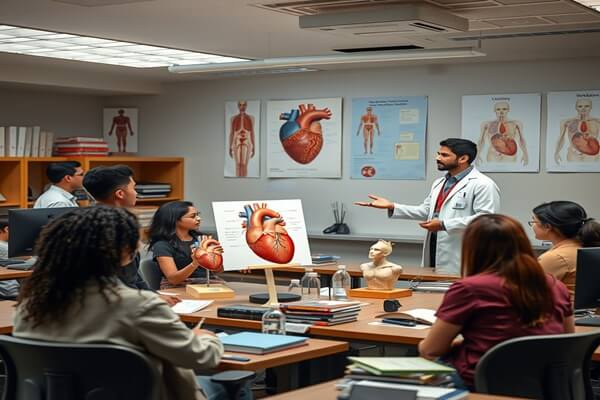How to Become Cardiologist After 12th in India

So, you’re thinking of becoming a cardiologist in India? That’s awesome! Whether you’re still in school or already on your medical journey, this guide is here to break down the path to becoming a heart specialist—step-by-step, without the confusing jargon. Let’s get into what it really takes to wear that white coat with a stethoscope slung proudly around your neck.
What Is a Cardiologist Anyway?
A cardiologist is a doctor who specializes in diagnosing and treating heart-related conditions. Think chest pain, heart attacks, high blood pressure, arrhythmias—you name it. It’s a high-responsibility, high-respect career that requires serious dedication, but it’s also one of the most rewarding fields in medicine.
Step 1: Choose Science with Biology After 10th
Your journey starts in school. After Class 10, you’ll need to pick the science stream in 11th and 12th, with Physics, Chemistry, and Biology (PCB) as your core subjects.
Why this matters:
-
You need Biology to be eligible for NEET (the medical entrance exam).
-
Scoring high in Class 12 and NEET increases your chances of getting into a top medical college.
Pro Tip: Start early with NEET prep alongside your board syllabus—coaching classes can help!
Step 2: Crack NEET and Get Into MBBS
NEET (National Eligibility cum Entrance Test) is your ticket to a medical college in India. It’s tough, no sugarcoating that—but totally doable with dedication and consistency.
What you need:
-
A high NEET score to secure a seat in a government or reputed private medical college.
-
Minimum age: 17 years.
-
Subjects: You should’ve studied Physics, Chemistry, Biology/Biotechnology in 12th.
Once you clear NEET, you’ll enroll in an MBBS program—a 5.5-year course (including a 1-year internship).
Step 3: Complete Your MBBS
MBBS (Bachelor of Medicine and Bachelor of Surgery) is your foundation. Here’s what you can expect:
-
Years 1–3: Learn the basics—anatomy, physiology, pathology, pharmacology, etc.
-
Years 4–5: Focus on clinical rotations—interacting with real patients in hospital settings.
-
Final 1 year: Compulsory rotating internship to gain hands-on experience.
Tip: Build strong fundamentals and explore your interest in cardiology during clinical postings in general medicine.
Step 4: Do MD in General Medicine
After MBBS, you’ll need to specialize before you super-specialize. To become a cardiologist, you must do an MD (Doctor of Medicine) in General Medicine.
Here’s how:
-
Appear for NEET-PG (Postgraduate entrance exam).
-
Secure admission to a 3-year MD program.
-
Learn everything about internal medicine—it’s your gateway to cardiology.
Why this step matters: Only after MD can you apply for a DM (Doctorate of Medicine) in Cardiology.
Step 5: Super-Specialize with DM in Cardiology
This is where you finally enter the world of heart health. The DM (Doctorate of Medicine) in Cardiology is a 3-year super-specialty course focused solely on cardiovascular medicine.
Entrance: You’ll need to clear the NEET-SS (Super Specialty) exam to get in.
During your DM, you’ll dive deep into:
-
ECGs, echocardiography, angiography
-
Heart failure management
-
Cardiac surgeries and interventions
-
Critical care and emergencies
Duration so far:
-
MBBS: 5.5 years
-
MD: 3 years
-
DM: 3 years
Total = 11.5 years (but totally worth it!)
Step 6: Apply for Certification and Registration
After finishing DM, you’ll need to:
-
Register with the Medical Council of India (MCI) or your respective state medical council.
-
Get certified as a cardiologist.
-
Consider joining the Cardiological Society of India (CSI) for credibility and networking.
You can now officially practice as a cardiologist in India—whether at a hospital, clinic, or even open your own heart care center.
Step 7: Start Your Practice or Join a Hospital
You’re ready to roll! Now it’s time to either:
-
Work in top hospitals as a cardiologist.
-
Join academic institutions if you love teaching.
-
Start your own private clinic.
-
Continue research or fellowships for sub-specialties (like interventional cardiology or pediatric cardiology).
Essential Skills for a Cardiologist
Being a cardiologist isn’t just about passing exams. You need:
-
Analytical thinking: To read reports and make diagnoses.
-
Precision and patience: One small error can cost a life.
-
Empathy: Your patients are often in distress.
-
Decision-making under pressure: Especially in emergency situations.
How Much Does a Cardiologist Earn in India?
Cardiology is one of the highest-paying medical specialties in India. Your income depends on experience, location, and type of practice.
Average salary:
-
Entry-level: ₹1.2–2.5 LPA (per month)
-
Mid-level (5–10 yrs): ₹3–6 LPA
-
Experienced (10+ yrs or private practice): ₹10 LPA and above
In private practice or top-tier hospitals, experienced cardiologists can earn over ₹25–30 LPA.
Career Paths After DM in Cardiology
After becoming a cardiologist, you can further specialize in:
-
Interventional Cardiology
-
Pediatric Cardiology
-
Cardiac Electrophysiology
-
Heart Transplant Surgery
Each offers a unique path depending on what aspect of the heart fascinates you most.
Quick Summary: Your Cardiologist Journey in India
| Stage | Course | Duration |
|---|---|---|
| 1 | 10+2 (Science with Biology) | 2 years |
| 2 | MBBS | 5.5 years |
| 3 | MD in General Medicine | 3 years |
| 4 | DM in Cardiology | 3 years |
| Total | — | 13.5 years (with NEET prep and buffer time) |
Final Thoughts: Is Becoming a Cardiologist Worth It?
Absolutely—if you’re passionate about saving lives, love challenges, and are in it for the long haul. Yes, the road is long and competitive. But if your heart is in the right place (pun intended!), the rewards—personal, professional, and financial—are immense.
Just remember: Start early, stay focused, and keep your end goal in mind.
Your Next Step
If you’re still in school, focus on your Biology and start exploring NEET prep. If you’re in MBBS, keep your eyes on the MD. Every little step matters.
Thinking long-term? Bookmark this guide and revisit it at each stage of your journey to becoming a cardiologist in India.



